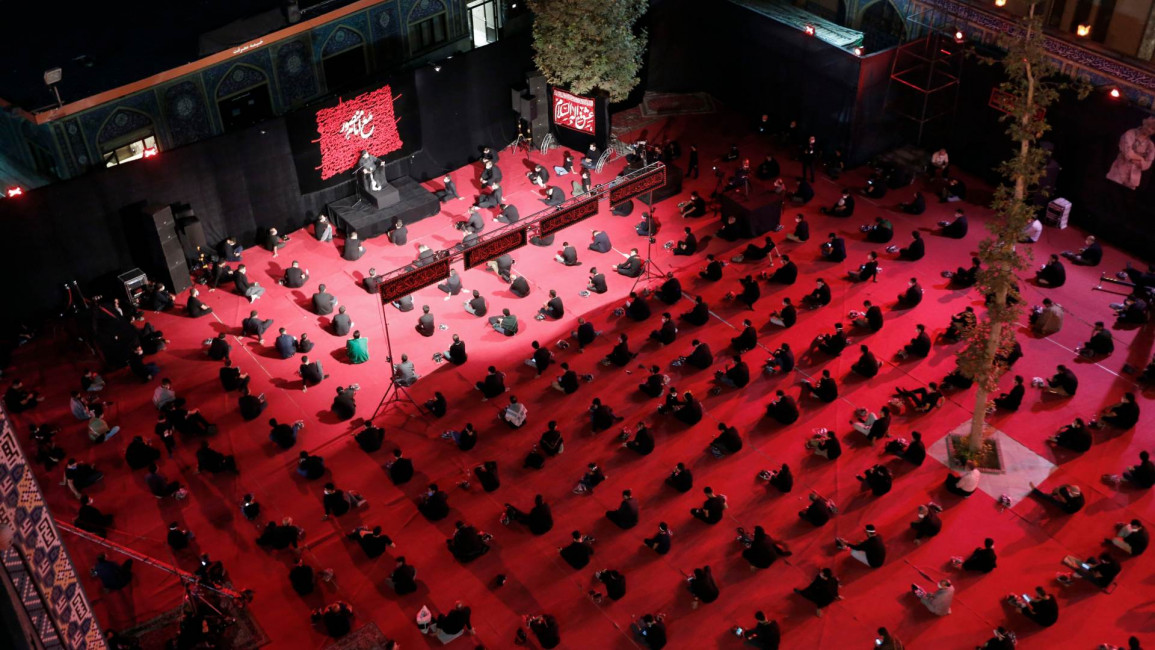Shia mourning rituals in Muharram ring with Iraq's demands for justice
"May God have revenge on every politician!" The anguished cry echoes across the revered Imam Hussein's shrine in Iraq's Karbala, as Shia pilgrims mourn his killing centuries ago and demand justice today.
The thousands of black-clad pilgrims are marking Muharram, the first month in the Islamic calendar, during which they commemorate the Prophet Mohammed's grandson and vow to fight oppression.
Hussein was killed at the Battle of Karbala in 680 AD by the forces of the Caliph Yazid.
The seminal event in Islam's confessional divide, it is seen by Shia Muslim's around the world as one of history's great unavenged injustices.
For some in Karbala, 80 kilometres (50 miles) southwest of Baghdad, the transgressions continue.
Their faces twisted in sorrow, two dozen men and boys solemnly carry portraits of some of the nearly 600 Iraqi protesters, activists and reporters killed since mass anti-government rallies erupted last October.
The Iraqi tricolour and the traditional black flags of Muharram, emblazoned with "Oh Hussein," flutter side by side in a rare late summer breeze.
The mourners stand in a cluster facing the bright neon lights of the main shrine and chant rhyming mourning chants customary during this month - with a twist.
"We saw how they assassinate honourable people!" they call out, pumping their arms rhythmically towards the shrine.
Among the portraits is a recent victim: 29-year-old Reham Yaaqub, an activist shot dead in the oil-rich southern city of Basra just last week.
Read more: Rest in Power: Reham Yacoub's assassination casts its long shadow over Iraq
Prime Minister Mustafa al-Kadhemi paid condolences to Yaaqub's family, vowing to hold her killers accountable.
But similar pledges regarding other slain protesters have so far gone unfulfilled.
'Hussein is revolution!'
Since demonstrations erupted in Baghdad and across southern Iraq on October 1 last year, protesters have regularly compared themselves to Hussein's companions, often shouting the slogan: "Hussein is revolution!"
Some have even drawn parallels between security forces burning protest tents and Yazid's forces setting alight the desert camp of the revered imam's followers.
But the tradition of mixing pilgrimage with protests far predates the 2019 movement.
Collectives in Karbala have organised marches against perceived injustices for decades, even staging small protests under feared Sunni dictator Saddam Hussein.
Despite taking place at the shrine, the marches are a rare melting pot, attracting communist-leaning youth alongside pious Iraqis.
The Abbasiyah Convoy is the oldest and most prominent such marching collective, active since the 1940s and native to the holy city.
"We are known as a revolutionary convoy, a revolution like Imam Hussein's. We want to convey the suffering of the Iraqi street to the whole world," says Hatem Nawras, an elderly attendee.
For Alaa al-Sarraf, who has been taking part in the Muharram chants for nearly two decades, "Hussein represents an awakening against injustice."
"We have a history of writing chants based on what the street wants: we opposed the US invasion and sectarianism after 2003, and today we support better services, an end to corruption and rights for all," he said.
Anger at Iran
Thousands of pilgrims have descended on Karbala since Muharram began on August 21, ignoring calls by officials and even clerics to stay home as the novel coronavirus spreads.
Iraq has logged more than 215,000 cases and more than 6,600 deaths, with the World Health Organization warning last week of an "exponential rise" that could create a major health crisis.
Coronavirus-linked restrictions meant Karbala has attracted fewer visitors in 2020 than in previous years, when millions of Shiites converged on the holy site from Afghanistan and neighbouring Iran.
But thousands still attended this year, some carrying banners referencing Tehran, which was heavily criticised during the protest movement for backing an Iraqi political class seen as corrupt and inept.
"How many government officials are followers of our 'neighbour'?" one poster read.
"They became its servants, and are happy with all this shame."
The "Mourning Procession of the October Martyrs," a new protest-pilgrim group, vows to keep up calls for justice.
"The rule of all tyrants will end, however long it takes," says pilgrim Ihab al-Wazni.
He has a bitter warning for Iraqi politicians: "Your day will come too, if you don't implement the demands of the Iraqi people."
Follow us on Facebook, Twitter and Instagram to stay connected



